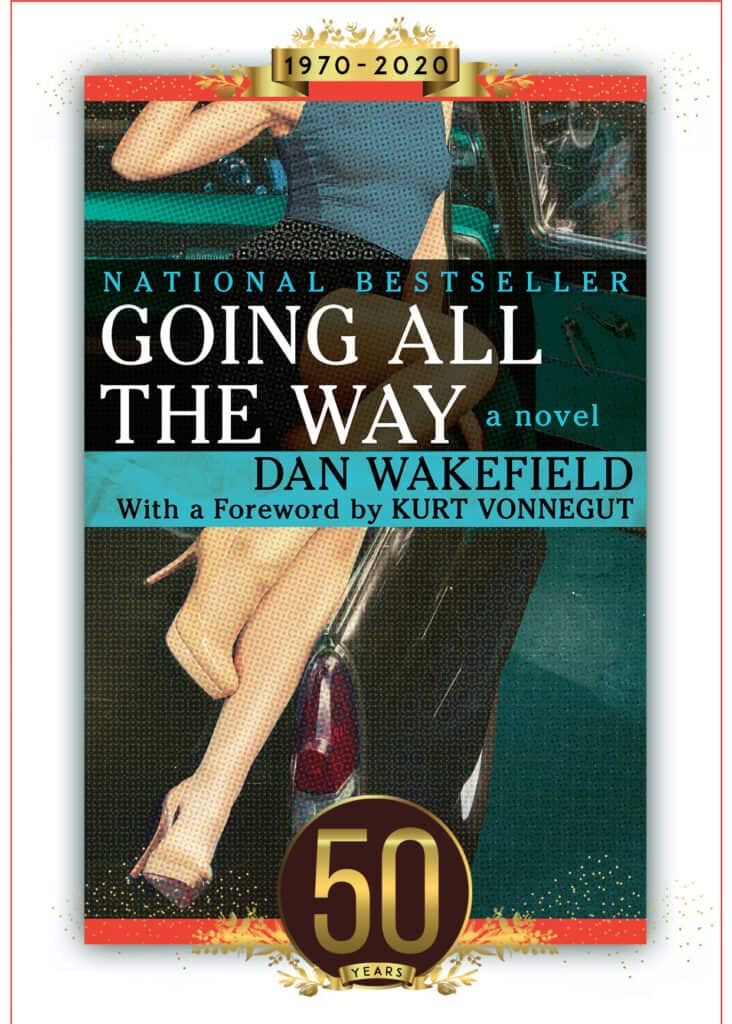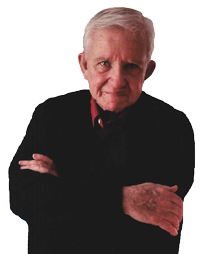
On Tuesday afternoon, August 18, we held a “socially distanced book signing” outside on the patio of The Red Key Tavern for the 50th anniversary of my novel Going All The Way. Twelve people signed up on my website to come at fifteen minute intervals from 5:00 p.m. to 7:30 p.m. My friend John Myers (a veteran of Korea) served as “Sergeant at Arms.” What a fine and appropriate way to celebrate the 50th anniversary of the novel!
This is part of a history that began during Christmas vacation of 1954, my senior year at Columbia. My Shortridge history teacher and friend, Dorothy Peterson, called me to say that Ted Steeg was home from Korea and he wanted to go to Columbia on the G.I. bill and would like to talk to me. Ted was in the Class of ’48 at Shortridge, two years ahead of me; he had been a star fullback for The Blue Devils and was elected ”Uglyman” – the most popular boy in the senior class. He went on to play for Wabash, and was a “Little [small college] All-American” as a defensive back. I had been a sports columnist and editor of The Shortidge Daily Echo two years after Ted graduated, and I was friendly with the jocks in my own class, so I felt socially qualified to hang out with Steeg. He called me and suggested we meet at The Red Key.
Like several other friends who had been in Korea, especially those who’d spent time in Japan, Ted had changed. The former football star/frat boy had started thinking outside the box. He was asking questions, of himself and of me (as well as of Indianapolis, America, and the world.) We sat at the end of the bar and talked and played the juke box and drank our beers and had a few more. Ted said he was going to start the M.A. in Literature program at Columbia in the spring semester, and he asked if he could stay with me when he got to New York. I explained I was living off campus in a basement apartment on West 77th street with only a single bed, a table and a chair, but he was welcome to stay on the concrete floor. One freezing night in February there was a knock at my door and I opened it to see Ted. He had a knapsack on his back, and he was holding a sleeping bag in one hand and a suitcase in the other. Our legend—our lifelong friendship—began.

That meeting was given a fictionalized version in the novel when “Sonny” and “Gunner” meet on the train back to Indianapolis after their time in the service. It was fictionalized for film in the 1997 movie in the same two seats at the end of the bar in the Red Key with Ben Affleck as “Gunner” and Jeremy Davies as “Sonny.” When Gunner wants another beer he says “Hit me again, Russ,” in tribute to the late Russ Settle, the founder and owner of The Red Key Tavern. Russ is not seen in the movie but he actually served that beer—in “real life” in ’54 as well as in the movie in ‘97. The Red Key is now owned and operated by Russ’s son Jim, usually the bartender, aided by Jim’s wife Dolly (who makes the legendary chili and potato salad in their respective seasons) and his daughter Leslie, who is either behind the bar or waitressing or both, with the welcoming spirit that seems to be built into the place.
My super website and social media experts, SuperPixel, arranged for fifteen minute time slots for each signing, and eleven people signed up—two were not able to make it, but two others arrived by accident, so everything worked out. It rained that morning but the sun came out in the afternoon and the day was fair and fine. My friend Susan Neville, who is Indiana’s finest writer, was the first guest to have her copy of Going All The Way signed. I had asked Susan to bring her own new book, The Town of Whispering Dolls, a powerful and entrancing collection of stories that won the Catherine Doctorow Prize for the “Best Book of Innovative Fiction in 2019.” [That’s a national award.] I got so excited about Susan’s book that I read one of my favorite passages to the next guests, after I signed their copy of my novel.
Everyone who came was a winner, but the prize must go to the man who came directly from the hospital where he had just had his pacemaker replaced. He pulled up his t-shirt to show us the new bandage.
For $25, everyone got the novel, the author’s signature, and a beer from The Red Key. All proceeds went to The Red Key Tavern, which we think should be the first step in its being declared a Historic Monument.
Our bargain deal reminded me of an ad for the William H. Block department store touting one of its own bargains. It was written by an advertising copywriter for the store named Phoebe Hurty, who in 1938 hired Kurt Vonnegut to write about Block’s clothes for teenagers in The Shortridge Daily Echo. Vonnegut dedicated his novel Breakfast of Champions to Phoebe Hurty, and he quoted her work that he most admired:
“She wrote this ad for an end-of-the-summer sale on straw hats: ‘For prices like this, you can run them through your horses and put them on your roses.’”
Vonnegut felt he would never be as gracious in prose as Phoebe Hurty. I am not about to try.
Read Kurt Vonnegut’s review of Going All The Way here.

